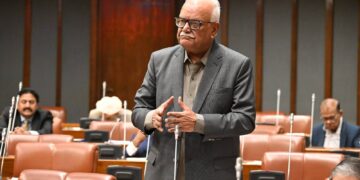ISLAMABAD: Zafar Masud, Chairman of Oil and Gas Development Company Limited (OGDCL), has said that privatization without first strengthening regulatory frameworks could lead to disastrous outcomes, potentially resulting in private sector monopolies that may be more harmful. https://youtu.be/OKzm1SQgGBM
Speaking virtually at the ‘Directors Summit 2024,’ organized by the Pakistan Institute of Corporate Governance (PICG) in Karachi, the OGDCL Chairman emphasized the critical need for reform in Pakistan’s energy sector, particularly in relation to the privatization of distribution companies (DISCOs) , which continue to be a significant drain on public finances.
Zafar Masud noted that the energy sector’s financial struggles reflect the broader challenges faced by State-Owned Enterprises (SOEs). While advocating for privatization, he warned that it should not be viewed as a cure-all solution, emphasizing that privatization should not be driven by a “pigeon-approach,” hoping that problems would simply disappear by closing the eyes.
The OGDCL Chairman said that without well-established regulatory frameworks, privatization could ultimately result in creating a private sector monopoly, which could be more harmful in the medium to long term by detracting from the core objective of providing utility services.
Zafar Masud also highlighted the importance of setting the right criteria for selecting private sector partners, urging the government to choose long-term players who prioritize societal impact over short-term profitability. “A private entity picked for privatization must have ‘patient capital’ and a long-term perspective, rather than focusing solely on short-term gains,” he said.
He warned that selecting the wrong partner, such as private equity funds, could end up spoiling the privatized utility or pushing the fund out of business.
The OGDCL chairman further underscored the importance of good governance structures for SOEs and private enterprises alike, warning that without proper governance, both types of entities would remain a burden on the national economy. “No amount of capital or resources can fix the systemic issues in SOEs without proper governance in place.”
Zafar Masud welcomed the introduction of the SOE Law as a significant step toward improving governance in SOEs. However, he noted that such reforms should only be viewed as transitional measures. “Ultimately, we must move towards privatization or public-private partnership structures,” he said, stressing the need for independent and empowered regulators to oversee these processes.
“Strong governance is crucial to unlocking the true potential of SOEs in Pakistan,” Zafar Masud said. He said that SOEs play a vital role in generating employment, building infrastructure, and supporting long-term economic growth.
Watch the video for Chairman OGDCL’s insightful talk.



















